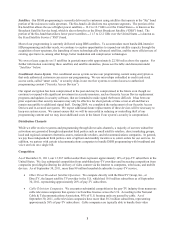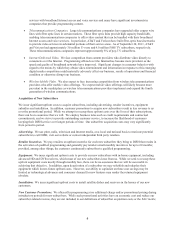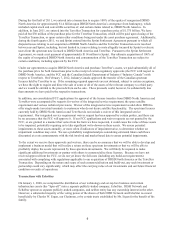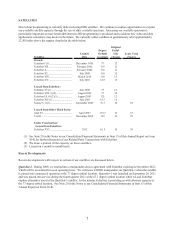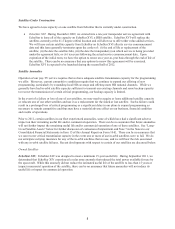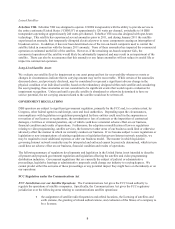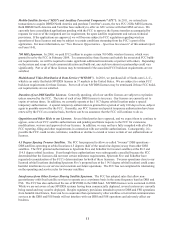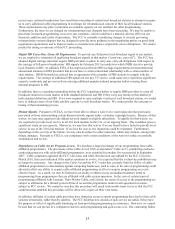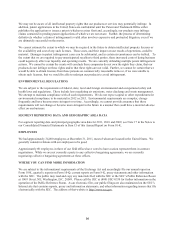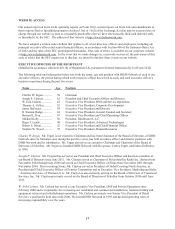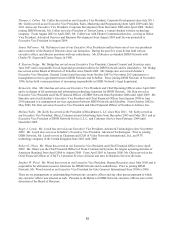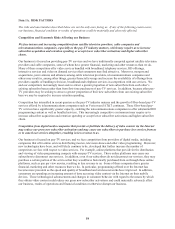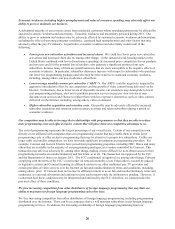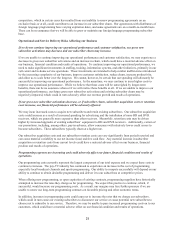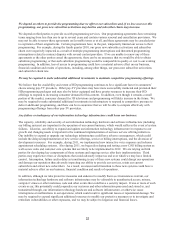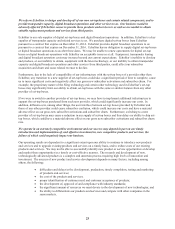Dish Network 2011 Annual Report Download - page 23
Download and view the complete annual report
Please find page 23 of the 2011 Dish Network annual report below. You can navigate through the pages in the report by either clicking on the pages listed below, or by using the keyword search tool below to find specific information within the annual report.13
13
recent years, national broadcasters have used their ownership of certain local broadcast stations to attempt to require
us to carry additional cable programming in exchange for retransmission consent of their local broadcast stations.
These requirements may place constraints on available capacity on our satellites for other programming.
Furthermore, the rates we are charged for retransmitting local channels have been increasing. We may be unable to
pass these increased programming costs on to our customers, which could have a material adverse effect on our
financial condition and results of operations. The FCC is currently considering changes to its rules governing
retransmission consent disputes that are designed to provide more guidance to the negotiating parties on good-faith
negotiation requirements and to improve notice to consumers in advance of possible service disruptions. We cannot
predict the timing or outcome of this FCC proceeding.
Digital HD Carry-One, Carry-All Requirement. To provide any full-power local broadcast signal in any market,
we are required to retransmit all qualifying broadcast signals in that market (“carry-one, carry-all”). The FCC has
adopted digital carriage rules that require DBS providers to phase in carry-one, carry-all obligations with respect to
the carriage of full-power broadcasters’ HD signals by February 2013 in markets in which DISH elects to provide
local channels in HD. In addition, STELA has imposed accelerated HD carriage requirements for noncommercial
educational stations on DBS providers that do not have a certain contractual relationship with a certain number of
such stations. DISH Network has entered into an agreement with a number of PBS stations to comply with the
requirements. The carriage of additional HD signals on our pay-TV service could cause us to experience significant
capacity constraints and prevent us from carrying additional popular national programs and/or carrying those
national programs in HD.
In addition, there is a pending rulemaking before the FCC regarding whether to require DBS providers to carry all
broadcast stations in a local market in both standard definition and HD if they carry any station in that market in
both standard definition and HD. If we were required to carry multiple versions of each broadcast station, we would
have to dedicate more of our finite satellite capacity to each broadcast station. We cannot predict the outcome or
timing of that rulemaking process.
Distant Signals. Pursuant to STELA, we have been able to obtain a waiver of a court injunction that previously
prevented us from retransmitting certain distant network signals under a statutory copyright license. Because of that
waiver, we may once again provide distant network signals to eligible subscribers. To qualify for that waiver, we
are required to provide local service in all 210 local markets in the U.S. on an ongoing basis. This condition poses a
significant strain on our capacity. Moreover, we may lose that waiver if we are found to have failed to provide local
service in any of the 210 local markets. If we lose the waiver, the injunction could be reinstated. Furthermore,
depending on the severity of the failure, we may also be subject to other sanctions, which may include, among other
things, damages. Pursuant to STELA, our compliance with certain conditions of the waiver is subject to periodic
examination and review.
Dependence on Cable Act for Program Access. We purchase a large percentage of our programming from cable-
affiliated programmers. The provisions of the Cable Act of 1992, as amended (“Cable Act”), prohibiting exclusive
contracting practices with cable-affiliated programmers, were extended for another five-year period in September
2007. Cable companies appealed the FCC’s decision, and while that decision was upheld by the D.C. Circuit in
March 2010, that court indicated if the market continues to evolve, it is expected that the exclusivity prohibition may
no longer be necessary. Any change in the Cable Act and the FCC’s rules that currently limit the ability of cable-
affiliated programmers to discriminate against competing businesses, such as ours, in the sale of programming could
adversely affect our ability to acquire cable-affiliated programming at all or to acquire programming on a cost-
effective basis. As a result, we may be limited in our ability to obtain access on nondiscriminatory terms to
programming from programmers that are affiliated with cable system operators. In the case of certain types of
programming affiliated with Comcast, Time-Warner Cable, and Liberty, the terms of access to the programming are
subject to arbitration for a limited period of time if we and the programmer cannot reach agreement on terms,
subject to FCC review. We cannot be sure that this procedure will result in favorable terms for us or that the FCC
conditions that establish this procedure will be allowed to expire on their own terms.
In addition, affiliates of certain cable providers have denied us access to sports programming they feed to their cable
systems terrestrially, rather than by satellite. The FCC held that new denials of such service are unfair if they have
the purpose or effect of significantly hindering us from providing programming to consumers. However, we cannot
be sure that we can prevail in a complaint related to such programming and gain access to it. Our continuing failure


